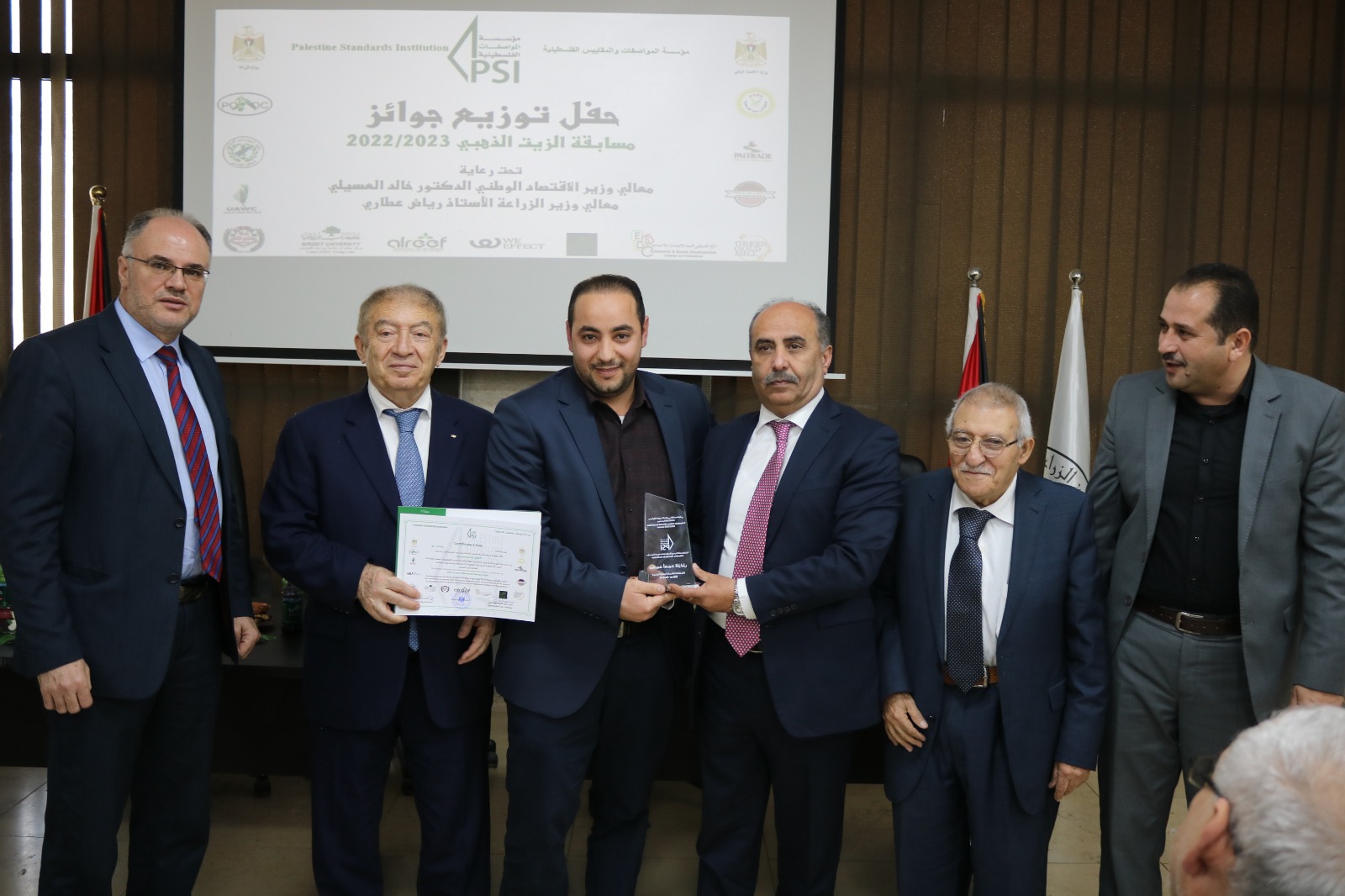"Standards and Metrology announces the names of the winners of the Golden Oil Award."

The Standards and Metrology Institute announced today, Tuesday, the names of the winners of the 15th Golden Olive Oil Competition for the 2022 season, which saw participation from 20 farmers.
The announcement took place during a ceremony held under the patronage and presence of the Minister of National Economy and Chairman of the Board of Directors of the Standards and Metrology Institute, Khaled Al-Asili, and the Minister of Agriculture, Riyad Attari. The event was organized in cooperation with partners including the Palestinian Oil and Olive Council, Pal Trade, the Union of Agricultural Work Committees, the Palestinian Economic Development Center, the Palestinian Engineers Association, Birzeit University, Al-Ard Company, Al-Reef Company, Yasser Mansour Company, Nablus Canning Company, the Food and Agriculture Organization of the United Nations (FAO), the Union of Agricultural Work Committees, and Al-Dhahab Al-Akhdar Olive Press.
The winners were ranked as follows: The Gold Award (First Place) was awarded to farmer Ibrahim Ma’qil Abu Ali from Jerusalem Governorate (Mukhmas), the Silver Award (Second Place) went to farmer Mohammed Ahmed Zaghl from Jenin Governorate, and the Bronze Award (Third Place) was given to farmer Abdul Hamid Ramadan from Nablus Governorate (Tel village). The fourth place was awarded to farmer Nili Rizq Abu Ali from Jerusalem Governorate (Mukhmas). The prizes included agricultural equipment and cash amounts provided by the partners.
In his speech, Al-Asili expressed his happiness with the winners of the Golden Oil competition, noting that it has become an annual tradition conducted by the Standards and Metrology Institute and its partners. The competition aims to encourage farmers to improve the quality of olive oil, which has religious, nutritional, and economic importance. He emphasized that the olive tree is a true symbol of the steadfastness of the Palestinian people on their land, much like the olive tree roots which are uprooted by the occupation authorities.
Al-Asili also confirmed that the determination of olive oil quality today relies on both the chemical properties and specifications of the oil, as well as sensory characteristics. For this reason, the institute developed the Olive Oil Quality Charter, which ensures the production of premium virgin olive oil in accordance with Palestinian standards and the International Olive Council standards for those who follow and implement it.
He added that the institute has developed a sensory analysis (tasting) laboratory for olive oil, operated by a national team trained over the past fifteen years to provide reliable and accredited test results.
He affirmed the ministry’s commitment to providing all support and resources for this product, aiming to be a leader in this field locally, regionally, and internationally due to its undeniable impact on enhancing the competitiveness of agricultural products.
Al-Asili praised the role of the Ministry of Economy in supporting national products by providing Palestinian olive oil with the necessary backing, including prohibiting the import of olive oil from abroad and raising awareness about increasing the Palestinian individual’s consumption of olive oil due to its health and economic benefits.
For his part, Minister of Agriculture Mr. Riyad Attari thanked the winners and those involved in organizing the competition. He added that olive oil has become a competitive product internationally and that this competition signifies a gradual move towards developing agricultural practices in Palestine and encouraging farmers to adhere to the necessary guidelines to obtain a high-quality and distinguished harvest.
Attari emphasized that everyone who participated in the competition is a winner, stating that the olive tree holds heritage, economic meaning, and political significance for all Palestinians.
Meanwhile, Fayadh Fayadh, Director General of the Palestinian Oil and Olive Council, described this olive oil season as “exceptional,” noting that production reached about 32,000 tons in the West Bank and Gaza. He also mentioned that there are approximately 301 olive oil presses in Palestine and stressed the importance of avoiding the use of plastic containers for storing oil, as this is unhealthy and dangerous—especially since some use containers previously used for herbicides, which poses serious risks.
Finally, Engineer Samer Farah, Head of the Farmers Syndicate, thanked the farmers and all supporting parties involved in the competition, noting that there has been a qualitative leap in olive oil quality from year to year.